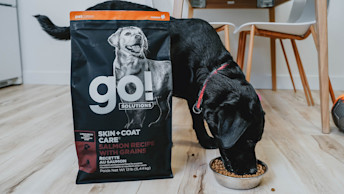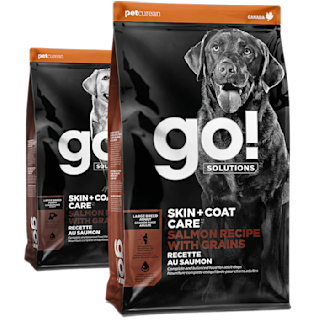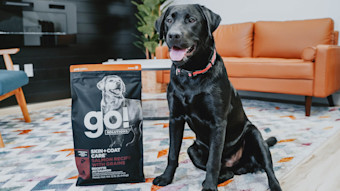October 30, 2025
Large Breed Dog Food Vs. Regular Dog Food

Choosing the right food for your dog isn’t just about picking the premium quality ingredients—it’s about finding a formula that meets their specific needs. If you have a large breed dog, you’ve probably come across food designed just for them. But what’s the difference between large breed dog food vs regular dog food? And does your dog need it? Let’s break it down.
What is Considered a Large Breed Dog?
Before we dive into the differences in food, let’s clarify what counts as a large breed dog. Generally, a large breed is any dog whose healthy adult body weight is expected to be over 50 lbs (23 kg) as an adult. Think Golden Retrievers, Labrador Retrievers, German Shepherds, and Great Danes. These breeds grow quickly and have unique nutritional needs to support their size, joints, and metabolism.
Key Differences Between Large Breed Dog Food and Regular Dog Food
While both large breed and regular dog food provide complete nutrition, the differences come down to the specific needs of bigger dogs. Here’s how large breed formulas are tailored to support their health:
1. Joint and Bone Support
Large breed dogs carry more weight, putting extra stress on their joints. That’s why their food often includes glucosamine and chondroitin, two key ingredients that support joint health and mobility. New Zealand green mussels are a natural source of joint-supporting chondroitin and may be found in some large breed diets.

Recommended Solution
Large Breed Dog Food Formulated by Nutrition Experts
Support the needs of your large or giant breed dog with our large breed dog food recipes. Crafted by pet nutrition experts to help your big dog look and feel their best.
View large breed dog food
2. Balanced Calories for Healthy Growth
Puppies from large breeds grow rapidly, and if they grow too fast, it can lead to skeletal issues. That’s why large breed dog food is designed to have controlled calorie content to support steady growth without overloading their developing bones.
For adult dogs, a well-balanced calorie distribution helps maintain a healthy weight. Overweight large breed dogs are at a higher risk for joint problems and heart issues, making portion control and calorie balance even more important.
3. Adjusted Calcium and Phosphorus Levels
Bone health is crucial for large breed dogs, and calcium and phosphorus play a big role. Large breed formulas are typically adjusted to maintain an optimal calcium-to-phosphorus ratio, preventing excessive bone growth, which can lead to orthopedic problems.
4. Heart Health Support
Larger dogs can be prone to heart issues, so their food often contains L-carnitine, an amino acid that supports metabolism and heart function.
5. Kibble Size and Texture
Large breed dog food often features larger kibble sizes. This encourages dogs to chew their food properly, helping with digestion and reducing the risk of choking or bloating—a condition more common in large dogs.

Does Your Dog Need Large Breed Dog Food?
If your dog falls into the large breed category, feeding them a diet specifically designed for their size can help support their overall health and longevity. Here’s when you should consider making the switch:
You have a large breed puppy: Feeding them a large breed puppy formula helps prevent growth-related skeletal issues.
Your adult dog’s healthy weight is over 50 lbs: They may benefit from joint support, controlled calorie content, and heart-healthy ingredients.
Your dog is prone to joint issues or obesity: Large breed formulas are designed to help maintain a healthy weight and support mobility.
The Bottom Line
Large breed dogs have different nutritional needs than smaller dogs, and the right food can make a big difference in their long-term health. With controlled calories, joint support, and heart-healthy ingredients, a large breed formula provides the right balance for your dog’s size and lifestyle.



